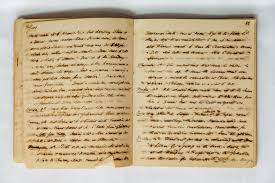How to start a journal

Pages filled, this journal shows the writing of a historic British soldier. Journaling is a way to preserve thoughts for years to come.
May 12, 2020
During the pandemic, many people are searching for new activities to try and form into habits. Journaling is the perfect hobby as it gives you a healthy way to channel feelings and thoughts. Whether these are Covid-19 related or not, journaling is something that anyone can benefit from. Not only is it a stress reliever, but this pastime also allows for self-reflection as well as an opportunity to track your progress towards goals. By now, you may be wondering how to start. Really all you need is a writing medium, and you are ready to go.
There are so many different options when it comes to starting a journal because there are essentially no rules. However, this can understandably be stressful when first beginning. Keeping journals online in the form of blogs or in private notes apps is gaining in popularity, but the classic notebook and pen is still a favorite among many avid journalists. Blogs are a great way to share feelings out in the open, but if you are looking for something focused more on self-growth then private journaling may be for you.
Journaling is a vague category, so when you pick up the pen it might be hard to think of what to write about. Some common journal themes include reflection, gratitude, morning pages, or mixes of all of them. The important thing is that you choose something that interests you. Reflection-based journals include standard diaries, where writers vent about their days or simply recall past events. These are great journals to look back on a few years down the road for laughs and nostalgia. Gratitude journals focus on positivity. Users write down what they are thankful for in order to keep themselves grounded. This is a good choice if you are looking for ways to appreciate the finer things in life. Another way to journal is with morning pages. This method is where journalists write three continuous pages as soon as they wake up. They write about whatever is on their mind and it helps them start the day with a clear head. It is important to remember that journals are personal and can be customized according to the user. Do not feel pressure to stick with one of these methods; do what feels right for you.
Another common issue with starting a journal is not knowing when to write. An easy way to start is by writing one entry a week. Writing once a week helps the user get the feel of journaling. Once they are comfortable they can increase or decrease the frequency of their entries. A second method, entering one line a day, helps prepare users for writing full entries daily. To help you remember to journal, you can set a reminder on your phone or any other device. This does not leave any room for forgetfulness. Although forming journaling into a daily habit is beneficial, it does not have to be every day. You can choose to only journal once a week or longer as well. If you can not commit to journaling every day but still want consistent entries, then backfilling is a good method. To backfill you simply add entries for days from the past. You should not go too far back though, sticking with just a week of backfilling is a perfect time to remember your daily thoughts.
Now that you know how to start your journal, break out your candles and coffee, and get to journaling today!











